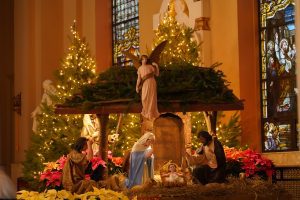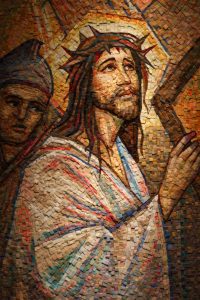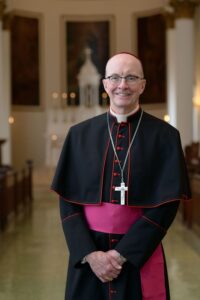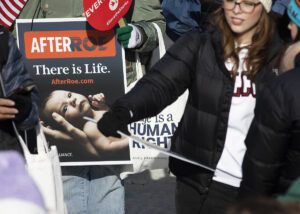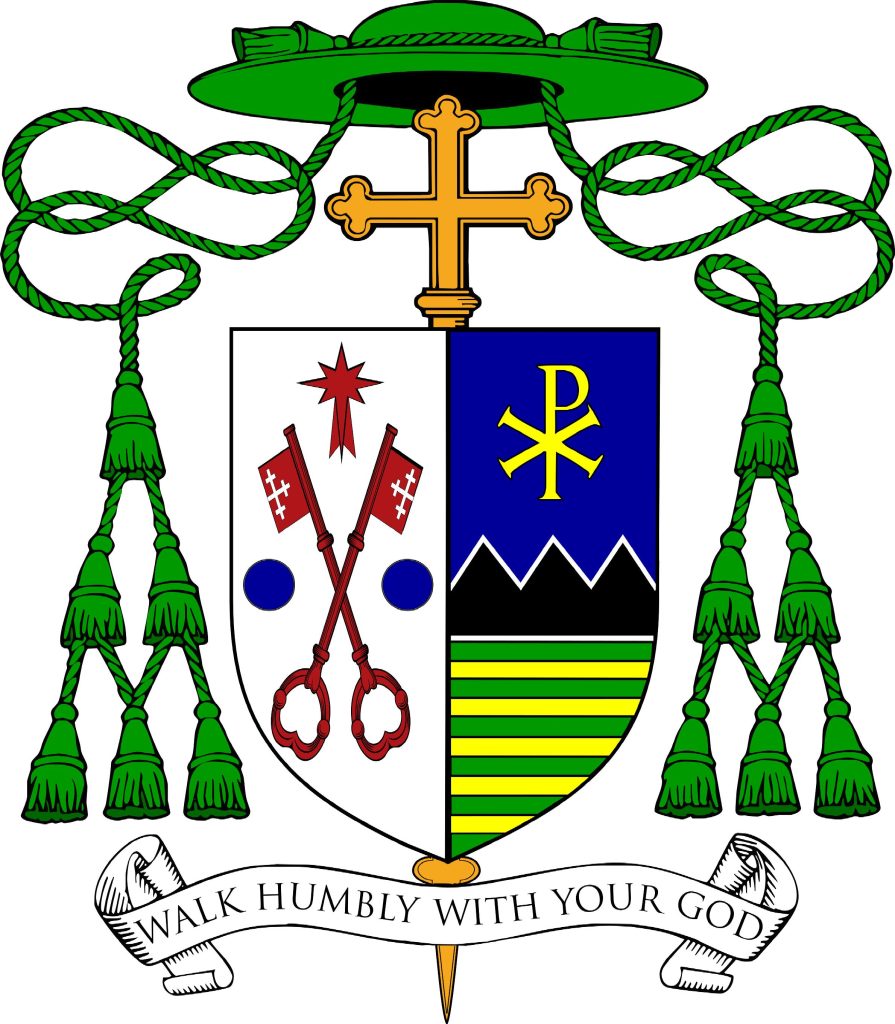 “For I was hungry and you gave me food, I was thirsty and you gave me drink, a stranger and you welcomed me” (Matthew 25:35)
“For I was hungry and you gave me food, I was thirsty and you gave me drink, a stranger and you welcomed me” (Matthew 25:35)
Faith is not just about belief. It is also about action.
As noted in the verse above from Matthew’s Gospel, how we treat others – particularly the most vulnerable in society – is directly linked to our relationship with Christ.
Put simply, when we serve those in need, we are serving Jesus Himself.
This basic principle is put into action every day across northeastern and north central Pennsylvania without a second thought: from young students collecting food for the less fortunate, to community organizations working together to provide nightly shelter to those experiencing homelessness, and parishioners in our parishes visiting the sick and lonely.
As Christians, this verse should also shape how we approach complex societal issues, reminding us to always act with mercy, dignity, and love.
The issue of immigration in the United States is one that often divides us. For some, the conversation revolves around safety, security, and order in our great nation, while for others, it is about compassion and human rights.
As followers of Christ, we must never forget one of the central and basic tenets of our faith: the dignity of every human person. Every person is made in the image and likeness of God – and that inherent dignity cannot be taken away by status or nationality.
From the very beginning of Scripture, God’s command to welcome the stranger is clear. The parents of Jesus had to flee their own land and take refuge in Egypt to save the life of their child.
Likewise, we must see Christ in those who seek refuge among us – whether because of war and widespread violence, religious and ethnic persecution, or human rights abuses. For many of these individuals, the decision to leave their homeland is often born out of desperation – and in the face of these concerns – we all have a responsibility to respond with compassion and understanding.
While the Catholic Church teaches us that individuals and families have the right to migrate, likewise, no country should be unduly burdened by those seeking refuge. To be clear, the United States has the responsibility to secure its borders and keep its citizens safe. Yet, as Pope Francis recently noted in a letter to the Bishops of the United States, “the true common good is promoted when society and government, with creativity and strict respect for the rights of all … welcomes, protects, promotes and integrates the most fragile, unprotected and vulnerable.”
Like many of my brother bishops, I am calling on our political leaders to set aside partisan politics and to fix our broken immigration system. But I pray that they do so in a way that respects Gospel values. Threats of mass deportations and allowing immigration officials to enter churches, schools, and healthcare facilities to conduct arrests, have only led to fear and anxiety for many of our brothers and sisters who live in our neighborhoods, attend our schools, provide useful services throughout our communities and worship with us on a regular basis.
Since its inception, our nation has been built upon the presence of immigrants who have contributed to the well-being and greatness of our land. As such, it is essential that we continue to support proper, legal pathways for immigration, ensuring that those who seek to contribute to society can do so in a manner that honors both their dignity and the lawful order of our communities.
As we pray for a system that honors the dignity of all people, one that is always guided by God’s love and justice, let us all remain hopeful that with faith, dialogue, and a commitment to justice, a solution to the complex challenges of immigration may be addressed in a way that honors the dignity of all.
May Our Lady of Guadalupe, the patroness of the Americas, intercede for us and for our nation, guiding us toward solutions that uphold the dignity of all people and reflect the mercy of Christ.
Defendiendo la Dignidad de Todos- Un Mensaje sobre la Inmigración del Muy Reverendo Joseph C. Bambera, Obispo de Scranton
“Porque tuve hambre, y me diste de comer; tuve sed, y me diste de beber; era forastero, y me acogiste” (Mateo 25:35)
La fe no es solo cuestión de creencias. También se trata de acción.
Como se señala en el versículo anterior del Evangelio de Mateo, cómo tratamos a los demás – particularmente a los más vulnerables en la sociedad – está directamente vinculado a nuestra relación con Cristo.
En pocas palabras, cuando servimos a los necesitados, estamos sirviendo al propio Jesús.
Este principio básico se pone en acción todos los días en el noreste y centro-norte de Pensilvania, sin pensarlo dos veces: desde los estudiantes más jóvenes recolectando alimentos para los menos afortunados, hasta las organizaciones comunitarias que trabajan juntas para proporcionar refugio nocturno a quienes experimentan la falta de vivienda, y los feligreses de nuestras parroquias visitando a los enfermos y solitarios.
Como cristianos, este versículo también debe moldear nuestra forma de abordar los complejos problemas sociales, recordándonos actuar siempre con misericordia, dignidad y amor.
El tema de la inmigración en los Estados Unidos es uno que a menudo nos divide. Para algunos, la conversación gira en torno a la seguridad, el orden y la protección en nuestra gran nación, mientras que para otros, se trata de compasión y derechos humanos.
Como seguidores de Cristo, nunca debemos olvidar uno de los principios centrales y básicos de nuestra fe: la dignidad de toda persona humana. Cada persona está hecha a imagen y semejanza de Dios, y esa dignidad inherente no puede ser arrebatada por el estatus o la nacionalidad.
Desde el principio de las Escrituras, el mandato de Dios de acoger al extranjero es claro. Los padres de Jesús tuvieron que huir de su tierra y refugiarse en Egipto para salvar la vida de su hijo.
De igual manera, debemos ver a Cristo en aquellos que buscan refugio entre nosotros – ya sea por la guerra y la violencia generalizada, la persecución religiosa y étnica, o las violaciones a los derechos humanos. Para muchos de estos individuos, la decisión de abandonar su tierra natal nace a menudo de la desesperación, y ante estas preocupaciones, todos tenemos la responsabilidad de responder con compasión y comprensión.
Mientras que la Iglesia Católica nos enseña que los individuos y las familias tienen el derecho a migrar, igualmente, ningún país debe ser excesivamente cargado por aquellos que buscan refugio. Para ser claros, los Estados Unidos tienen la responsabilidad de asegurar sus fronteras y mantener a salvo a sus ciudadanos. Sin embargo, como el Papa Francisco señaló recientemente en una carta a los obispos de los Estados Unidos, “el verdadero bien común se promueve cuando la sociedad y el gobierno, con creatividad y un estricto respeto por los derechos de todos… acogen, protegen, promueven e integran a los más frágiles, desprotegidos y vulnerables.”
Como muchos de mis hermanos obispos, hago un llamado a nuestros líderes políticos para que dejen de lado la política partidista y arreglen nuestro sistema de inmigración roto. Pero rezo para que lo hagan de una manera que respete los valores del Evangelio. Las amenazas de deportaciones masivas y permitir que los funcionarios de inmigración entren en iglesias,
escuelas y centros de salud para realizar arrestos, solo han generado miedo y ansiedad en muchos de nuestros hermanos y hermanas que viven en nuestros vecindarios, asisten a nuestras escuelas, brindan servicios útiles a lo largo de nuestras comunidades y adoran con nosotros de manera regular.
Desde su inicio, nuestra nación ha sido construida sobre la presencia de inmigrantes que han contribuido al bienestar y la grandeza de nuestra tierra. Por lo tanto, es esencial que sigamos apoyando caminos legales y adecuados para la inmigración, asegurando que aquellos que buscan contribuir a la sociedad puedan hacerlo de una manera que honre tanto su dignidad como el orden legal de nuestras comunidades.
Mientras oramos por un sistema que honre la dignidad de todas las personas, uno que siempre esté guiado por el amor y la justicia de Dios, sigamos teniendo esperanza de que, con fe, diálogo y un compromiso con la justicia, se pueda abordar la solución a los complejos desafíos de la inmigración de una manera que honre la dignidad de todos.
Que Nuestra Señora de Guadalupe, patrona de las Américas, interceda por nosotros y por nuestra nación, guiándonos hacia soluciones que defiendan la dignidad de todas las personas y reflejen la misericordia de Cristo.

